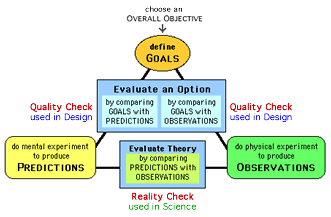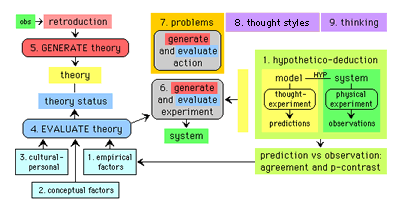Integrated Design Method
[ full-sized diagram with no photo-reduction ]
Integrated Scientific Method
[ full-sized diagram with no photo-reduction ]


Ideas for Thinking Skills Education:
ACS presentations by Craig Rusbult, Ph.D.
Below are the abstracts (plus the Powerpoint & Poster-Pages) for my poster sessions and talk at the Spring 2011 national meeting of the American Chemical Society, March 27-31 in Anaheim, California. { Additional information — about the time & location, other people in the same session,... — is in the end-of-page appendix. }
abstract for ACS talk: Teaching Scientific Thinking Skills in Chemistry Labs — Science labs are an ideal context for helping students learn the creative-and-critical thinking skills used by scientists. This educational goal can be pursued in a two-step strategy: use integrative analysis of instruction (developed in my PhD project studying scientific method, and summarized in a web-page about improving lab education *) to find learning opportunities in current labs or potential labs; develop “guided inquiry” coaching methods, using questions and hints plus motivational hybrid assessments (with discussions, report grading, online quizzes, lab exams) to help students and teachers learn more from their experiences. We'll look at principles of learning, and examples of thinking skills (observation-based inference, mathematical data analysis, achieving consensus, social process in science, practical applications & products, hypothetico-deductive logic and crucial experiments, calibration reasoning, experimental design, and more) from two decades of teaching science labs. (* asa3.org/ASA/education/teach/dblabs.htm) (and you can see my POWERPOINT-SLIDES FOR THE TALK in HTML & PDF & PPT)
abstract for ACS poster session: Thinking Skills Education using Design Method and Scientific Method — Creativity and critical thinking are combined for improvised problem solving in a wide range of areas (engineering, medicine, sports, business, science,...) to design a product, strategy, or theory. How can we help students improve these skills? What are the similarities & differences between science and design? Why should we teach design before science? During and after my PhD work, I've developed educationally useful models of Scientific Method and Design Method. For an overview-sampler of ideas, asa3.org/ASA/education/think/scientific-method.htm#ism / [also, not in the abstract but for readers of this page, my Ideas for Education] (and you can see my POSTER-PAGES FOR THE SESSION)
a verbal-and-visual model of Integrated Design Method [ full-sized diagram with no photo-reduction ] |
a verbal-and-visual model of Integrated Scientific Method [ full-sized diagram with no photo-reduction ] |
|
 |
 |
There are also versions of these diagrams that have more details, for
Integrated Design Method and Integrated Scientific Method.
TIME-and-LOCATION, . . . * If these links don't work properly because the website demands a log-in, click here and search for "general" to find General Posters (Sunday) & General Papers (Wednesday), and search for "mix" to find Sci-Mix (Monday). / And if it still doesn't work, start at the beginning: go to the ACS homepage and click the tab for "Meetings" and click "Spring 2011" and "Technical Program" and "CHED: Division of Chemical Education", and then search for "general" and "mix". |